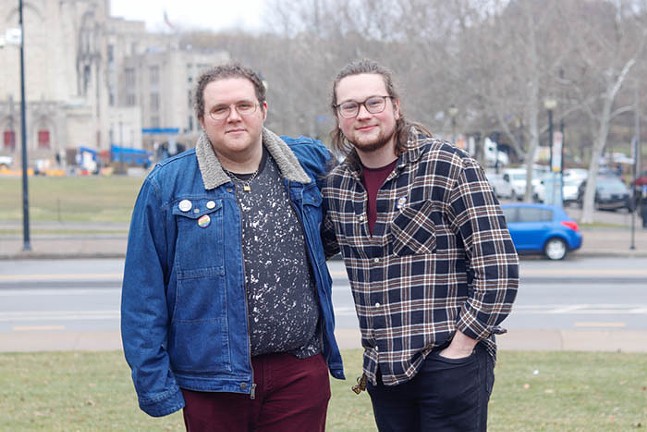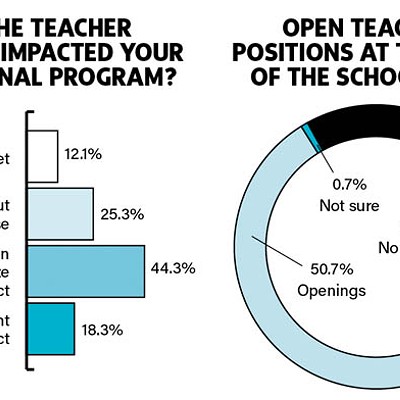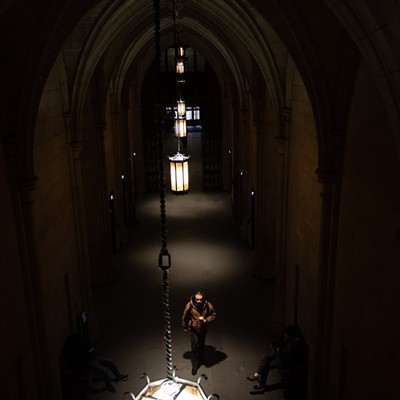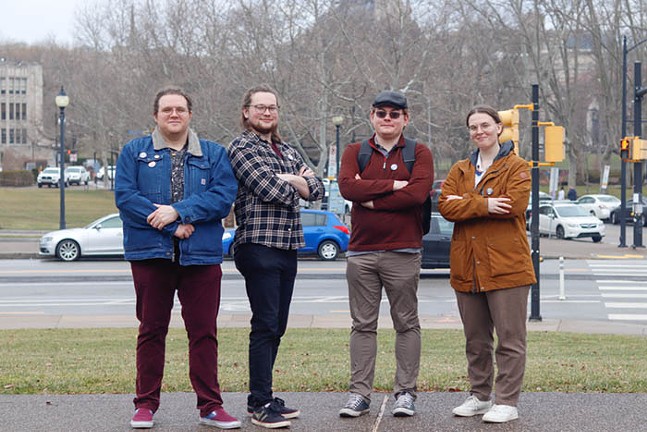
Pat Healy has spent much of graduate school living paycheck to paycheck, sometimes only narrowly making rent. They earn about $10,000 each semester for teaching information science classes at the University of Pittsburgh, and their contract prevents them from taking on a second job.
That wage simply does not stretch far enough, they say.
“If you don't have a support structure coming into grad school, or don't have some amount of money put away in savings,” Healy says, “you are going to be living in a very precarious position.
“This is essentially mandated poverty for an extended period of time,” they add.
Hoping to change this, Healy is part of an organizing committee seeking union representation for the university’s roughly 2,000 eligible graduate students. Topping their list of demands are calls for better pay, job security, and more input on how their programs are run.
In 2019, graduate students at Pitt attempted to unionize, but their election vote fell short of a majority. Organizers say the university administration relied on illegal worker intimidation to sway voters, prompting a legal challenge that stretched out two years. The Pennsylvania Labor Relations Board ultimately upheld the results — they found that Pitt did engage in unfair labor practices during the election, but not at a level that would significantly impact results.
Now, students are beginning the process again, and they’re hopeful this time a resurgence in labor organizing that’s swept through the city will carry them along.
Since 2020, more than 300 employees at the Carnegie Library system have unionized and won contracts, as have contractors at Google, workers at the Planned Parenthood of Western Pennsylvania, and baristas at dozens of regional Starbucks shops. Other workers in fields ranging from media to medical marijuana have won union elections since 2020 and are now working on securing contracts.
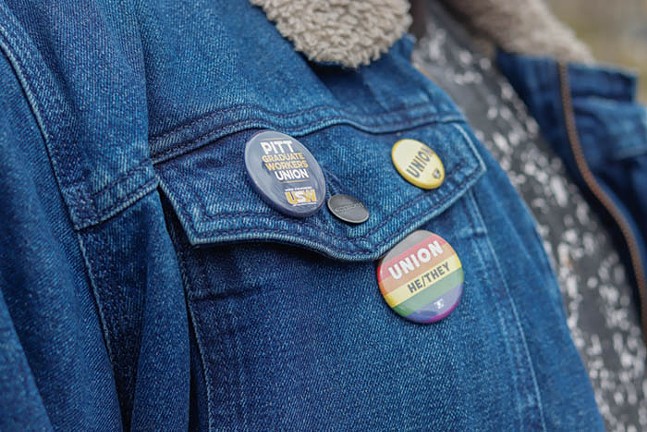
Trevor Wilson, a Pitt graduate who helped lead the original organizing drive, tells Pittsburgh City Paper he sometimes feels they struck too soon.
“I sometimes wonder if we had done the vote maybe just two years later, it may have been different,” Wilson says. “I feel like the political atmosphere in the country was in a different place than it is right now.”
Mariana Padias, assistant director of organizing for the United Steelworkers, says opinion research points to a promising outlook for organized labor.
“The polling that we're seeing is showing that younger generations are more pro-union than previous ones. And we see that people are more concerned about the collective, and really see working together rather than individually as a way to resolve problems,” Padias says.
Despite these encouraging signs, graduate organizers face unique challenges in securing union representation.
Healy says the path to a union involves “10,000 conversations” — a task compounded by changing workplace conditions.
“We're talking about a group of people that through the pandemic are largely fully remote to the point that if they don't answer our emails, we can't start a conversation,” Healy says. “And if we can't start a conversation, we can't do our work.”
Student organizers say the transient nature of the graduate student population is another barrier to unionizing. At Pitt, they say, most are only enrolled for five years or fewer, while some programs like the Creative Writing MFA typically last just three years.
As an organizer, Padias sees how this turnover can sap momentum.
“Every employee’s goal is to not be there, right?” Padias says. “There's no chance of longevity. And so it's a challenge to figure out how to engage people on a regular basis, and then develop them, and then to be consistently developing a group of activists behind them to take their place, and to start the cycle over again.”
But Healy says the pressure to take on increasing teaching and research responsibilities, while low compensation remains, makes organizing the only tenable option.
In addition to teaching a class of 60 students, Healy also has research responsibilities that sometimes take them far outside of Oakland. But, they say, they take on these assignments to meet their department’s expectation that grad students frequently publish work in peer-reviewed journals.
“I think a very obvious tension then arises whenever we are working 80 hours a week, but we are paid poorly for 20 hours of that work,” Healy says. “And I see that very visibly in my own department.”
Connor Chapman, a Ph.D. student in Pitt’s sociology department, points out that many graduate students are attempting to support families on their stipends.
“I can’t even imagine that extra dimension of having to support a dependent or spouse on our stipend,” he tells CP.
“It's not sustainable, really, for anybody, for graduate students [or] for faculty,” Chapman says of students’ increasing workload.
Healy says their department — information sciences — outsources a significant amount of teaching responsibility to adjunct faculty and grad student workers in a process they refer to as “the ‘adjunctification’ of academia.”
For example, Healy says they are currently teaching a class for which they have not passed a comprehensive exam.
“They made an exception for me … but also because they needed someone to teach,” Healy says. “The options were either let me teach or try to find an adjunct to teach, or increase the workload of existing faculty.”
Experts in higher education labor rights say this fits into a national trend that’s been underway for decades.
Between 2005 and 2015, grad student worker employment grew at triple the rate of tenure-track faculty at universities nationwide, according to William Herbert, director of Hunter College’s Center for the Study of Collective Bargaining in Higher Education.
“By 2017, graduate assistants and contingent faculty made up 73.2% of the entire academic workforce,” Herbert writes, “yet grad student employee compensation had fallen below the average cost of living in most major cities.”
While graduate organizing is uniquely challenging, the majority of area universities don’t have unions for faculty and adjuncts. In some cases, it’s not for lack of trying.
Efforts to organize adjunct teachers at Duquesne University were thwarted in 2020 by a federal judge who upheld the school’s argument that its status as a religious institution exempts it from national labor laws.
A few years earlier, an effort by faculty at Chatham University fell short of the necessary votes to unionize after the administration reportedly clamped down on the movement.
Lou Martin, a Chatham labor historian whose supervisory role prevented him from joining the union efforts, says anti-labor policies permeate through college and university administrations.
“It seems like most higher ed institutions are committed to anti-union tactics such as claiming that unions are ‘outside agitators,’ as well as hiring law firms that specialize in anti-union propaganda,” Martin tells CP in an email statement.
While faculty at Pitt now have union representation, administration fought back, spending, according to the Pitt News, nearly $3 million in legal fees between 2015 and 2021.
A Pitt spokesperson defended the administration’s course during the labor disputes, noting, “The United Steelworkers made a number of allegations that the University’s communications were improper and, ultimately, the PLRB rejected each claim that was made,” a spokesperson tells CP in an email statement.
“The University did keep a voter list and, in doing so, followed PLRB regulations. To that end, the PLRB ruled in the University’s favor when the United Steelworkers tried to bring an appeal on that basis.”
Padias says the graduate and faculty organizing drives are treated as separate campaigns with“different interests and different goals.” But, Chapman says, students feel they’ve mostly been supported by faculty.
“A lot of my mentors now, and colleagues that I very much respect, are very supportive of our efforts, and they've offered me lots of advice on how to proceed,” Chapman says.
Pitt’s faculty union did not respond to requests for comment on this story.
Padias says the United Steelworkers remains committed to extending the union’s reach to grad students at Pitt.
“Right now we're engaged in ground conversations, which we think are the starting point, and the building block of any organizing campaign,” she says. “We remain committed to helping put together a plan to win for the graduate students at Pitt.”
Healy and Chapman say, whatever happens at Pitt, they believe their work feeds into a larger national movement.
“If you unionize one university’s grad students, those grads aren't just staying there, they're going everywhere else,” Healy says.
Looking back, Wilson, now a tenured Russian language professor, has no regrets of the time he invested in organizing at Pitt. It was, he says, always about something bigger than immediate individual gains.
“I was just so proud of everybody who did it,” says Wilson. “If that election would have won, I would not have seen that contract, my colleagues would not have seen that contract — but we did it for the others, and for the future of the programs.”
CORRECTION: This article has been updated to correct a caption that incorrectly identified Connor Chapman as Connor Michael. A print version of this story contains the incorrect name. We regret the error.

